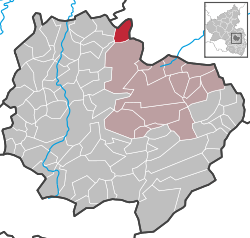Mörsfeld
| Mörsfeld | ||
|---|---|---|
| ||
 Mörsfeld | ||
Location of Mörsfeld within Donnersbergkreis district  | ||
| Coordinates: 49°44′39″N 7°56′6″E / 49.74417°N 7.93500°ECoordinates: 49°44′39″N 7°56′6″E / 49.74417°N 7.93500°E | ||
| Country | Germany | |
| State | Rhineland-Palatinate | |
| District | Donnersbergkreis | |
| Municipal assoc. | Kirchheimbolanden | |
| Government | ||
| • Mayor | Ulrich Volker | |
| Area | ||
| • Total | 5.25 km2 (2.03 sq mi) | |
| Population (2013-12-31)[1] | ||
| • Total | 461 | |
| • Density | 88/km2 (230/sq mi) | |
| Time zone | CET/CEST (UTC+1/+2) | |
| Postal codes | 67808 | |
| Dialling codes | 06358 | |
| Vehicle registration | KIB | |
Mörsfeld is a municipality in the Donnersbergkreis district, in Rhineland-Palatinate, Germany.
History
The area which is now Mörsfeld was originally settled at the end of the 9th century. It was supposedly named after a settler named Moro with the oldest recorded spelling of the town as "Morßfelt." About 1 km from the town itself is a place called the Daimbacherhof; a Cistercian monastery was founded there in the 13th century. In 1525, during the Peasants' War, the town as well as the monastery were destroyed. Also in the Daimbacherhof were mercury mines which were mined successfully until the early 19th century with production only being brought to a halt during the Thirty Years' War. Mörsfeld was further ravaged during a period of war from 1792 to 1801.[2]
References
|
